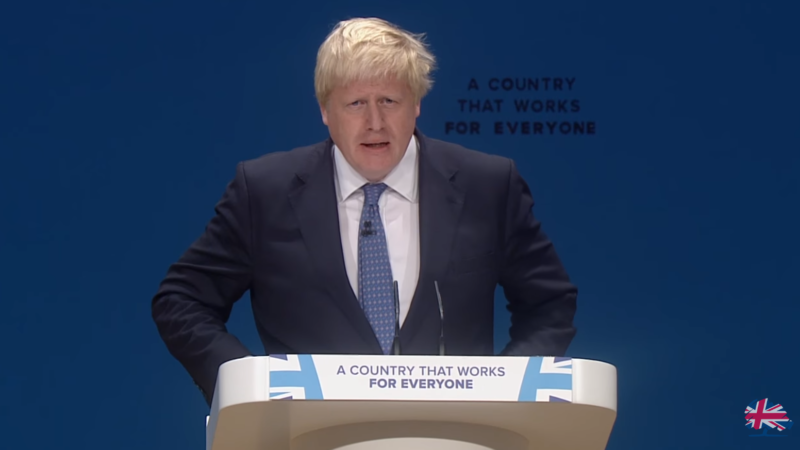'Levelling-up’ has been used as a slogan by Boris Johnson’s government to implement its far-right policies.

Prem Sikka is an Emeritus Professor of Accounting at the University of Essex and the University of Sheffield and a Labour member of the House of Lords.
‘Levelling-up’ has been used as a slogan by Boris Johnson’s government to implement its far-right policies. The slogan again appeared during the Queen’s speech to parliament, promising better opportunities, jobs, prosperity and social infrastructure. Yet the government’s policies do the exact opposite, obstructing levelling-up, social mobility and justice, condemning masses to hardship.
The social indicators are there for all to see. In 2019, the UK’s six richest people controlled as much wealth as the poorest 13 million. The richest 10% of households hold 44% of all wealth. The poorest 50% own just 9%. The poorest fifth of society has only 8% of the total income. The top fifth has 40%. In just three days, FTSE 100 bosses collect the median wage of a full-time worker. The government has no policies for curbing fat-cattery or redistributing income and wealth.
Inequalities in food, housing, education, health, pension and other areas are a direct result of inequalities in the distribution of income and wealth, but for more than a decade the UK government has enforced austerity and presided over wage freezes. In February 2020, the average weekly wage was £474, compared to £473 in March 2008.
Even before Covid, 14.5 million people, including 8.1 million in working families were living in poverty. Some 4.5 million children lived in poverty. It is the highest number of people living in poverty since statistics were collated in 2002 and the numbers are expected to rise. In one of the world’s richest economies, including those in full-time work, people have to rely upon foodbanks and charity to survive.
There has been a systematic attack on trade unions and workers’ rights. Low minimum wage, zero hour contracts and job insecurity have taken their toll. In 1976, the workers’ share of GDP in the form of wages and salaries was 65.1%, compared to 49.5% at the end of 2019. This decline is unmatched by any other democratic country. Buying their own home remains just a dream for many.
People on low incomes cannot save enough for old-age and will inevitably rely upon the state pension. Despite the triple-lock, the average UK state pension is around 29% of average earnings. It is the worst out of economically developed countries and less than half the national minimum wage. Every winter, thousands of retirees die due to lack of heating. Nearly three million Brits are malnourished and 1.3 million of these are over the age of 65. The government is not seeking to align the state pension with the minimum wage.
Rather than embracing progressive taxation and redistribution to level-up, the government has used regressive tax policies to hit the poorest. The TaxPayers’ Alliance states that poorest 10% of households pay 47.6% of their income in direct and indirect taxes, compared to 33.5% by the richest 10% of the households. Value Added Tax, council tax and national insurance contributions are some of the most regressive taxes levied by the government.
The rich are showered with special tax regimes. For example, only the rich are able to generate capital gains from the sale of second homes, stocks and shares and art works. There is no qualitative difference between earned and unearned income, but capital gains are taxed at rates between 10% and 28% compared to earned income which is taxed at marginal rates varying from 20% to 45%. Most of the beneficiaries live in London and the South East of England and the capital gains tax regime has exacerbated regional inequalities as well.
Tax relief of around £40 billion a year is provided on contributions to pension schemes. Just 10% of taxpayers, high earners, receive 50% of the tax relief. Some 1.3 million individuals with earnings below the tax-free personal allowance receive no tax relief or help with their contributions to pension schemes.
The government might claim that it has increased tax free personal allowances though they will now be frozen until 2026. However, the increase in personal allowances has not changed the burden of tax on the poorest. The increase does not help 18.4 million individuals whose annual income is less than £12,500.
The rich can afford private healthcare but the less well-off rely upon the National Health Service (NHS), which has been steadily dismantled. For example, 2.5 million people were waiting for hospital treatment in England in 2010. Even before coronavirus, the NHS waiting list rose to 4.6 million in September 2019 with 224,205 patients waiting for treatment for more than 52 weeks. At the end of March 2021, the waiting list rose to 4.95 million, with 436,127 patients waiting for treatment for more than a year.
This week, I referred the above statistics to the government and invited the minister to explain how the government will level-up. There was no response. The above statistics provide a glimpse of the state of society. To begin levelling-up, the government will need to invest in public services. It will need to empower trade unions and workers, increase workers’ share of GDP by reducing capital’s share, embrace equitable distribution of income and wealth and progressive taxation, increase the state pension and much more.
However, it will do none of these things. Levelling-up is just another slogan.
To reach hundreds of thousands of new readers we need to grow our donor base substantially.
That's why in 2024, we are seeking to generate 150 additional regular donors to support Left Foot Forward's work.
We still need another 117 people to donate to hit the target. You can help. Donate today.



